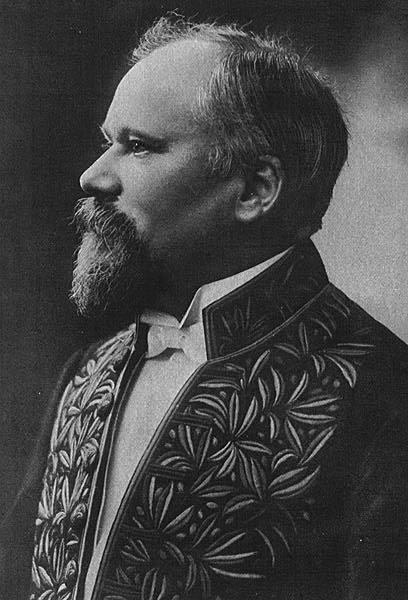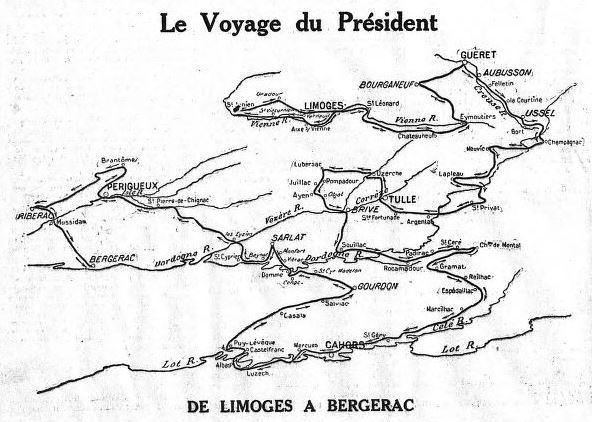
Raymond Poincaré (20 August 1860 – 15 October 1934) was a French statesman who served three times as Prime Minister, and once as President from 1913 to 1920. He was born in Bar-le-Duc (Meuse). Our interest in him lies in his visit to our area – and in particular Bergerac, in the September of 1913.
He was a conservative leader, primarily committed to political and social stability. Trained in law, Poincaré was elected a Deputy in 1887, and served in the cabinets of Dupuy and Ribot. In 1902, he co-founded the Democratic Republican Alliance, the most important centre-right party under the Third Republic, becoming Prime Minister in 1912 and President in 1913. He was noted for his strongly anti-German attitudes, and twice visited Russia to maintain strategic ties. At the Paris Peace Conference, he favoured re-occupation of the Rhineland, which he was able to carry out in 1923 as Prime Minister.

The programme for his presidential visit was published in Le Figaro 6th September 1913. We have transcribed it here, and apologies for probably getting some of it wrong – in particular some of the place names.
Lundi 8 – A Limoges, le soir, un diner sera offert par le Conseil général de la Haute-Vienne. Ce diner sera suivi d’une soirée à la préfecture.
Mardi 9 – Excursion à Saint-Junies, et retour à midi pour assister un banquet des maires. Dans l’après-midi, M. le Président visiters l’hôpital, la Chambre de Commerce, le musée cèramique et la manufacture Haviland. Le soir, M. Le Président offira un diner-à la préfecture de la Haute-Vienne.
Mecredi 10 – Départ de Limoges à 7h. 45 par Eymoutiers et Bourganeuf pour arriver à Guéret pour déjeuner. Aprés le déjeuner, départ pour le sanatorium de Sainte-Feyre, Aubusson (visite de l’exposition des tapisseries), Ahun, Alleyrat, Felletin et arrivée à six heures à La Courtine où le Président offre un diner aux autorités et aux personses qui l’accompagnent.
Jeudi 11 – Départ à 7h. 45 de La Courtine pour Tulle en passant par Bort, Neuvic, Lapleau, Argentat, Beauises, et arrivée à Tulle où le Conseil général offre un diner en l’honneur de M. le Président.
Vendredi 12 – Départ de Tulle à 7h. 45 pour Brive, en passant par Uzerchés, Salon-la-Tour, Le Vert, Lubersac, Pompadour, Juillac, Ayen et Objat.
Samedi 13 – Départ à 8 heures de Brive pour Cahors, en passant par Sozillac, Rocamadour, Plasac, Galôs, Gramat, Cousous, Autoire, Montal (dejeuner au château de Montal), Saint-Oéré, Aynac, Thémines, Espédaillac, Marcilhac, Cabrerets, Conduehé, Saint Géry, Le Vers, arrivée à Cahors à 5 heures; diner offert par le Conseil général du Lot; fête de nuit sur la Lot.
Dimanche 14 – Départ à 8 heures de Cahors pour Périgueux par Gourdan, Domme, Sarlat, où a lieu un déjeuner offert par la ville, et arrivée à Périgueux à 1 h 1/2. Visite de la ville, de l’hospice et du parc Périgourdin. Le soir, banquet offert par la ville à M. le President.
Lundi 15 – Départ à 7h. 45 de Périgueux par Ribérac, et arrivée à midi à Bergerac où un déjeuner est offert par la ville. A 3 heures, départ de Bergerac en chemin de fer, par Agen où M. le Président arrive à 5 heures. Aprês avoir reçu les autoités du Lot-et-Garonne, M. le Président quitte Agen à 6 heures pour se rendre aux manoeuvres d’armée où il passe la journée du mardi 16 et la matinée du lendemain mecredi 17.
Mercredi 17 – A 2h. 1/2 de l’aprés-midi, M. le Président arrive à Toulouse, et, le soir, il offre un diner au l’honneur des autorités de la ville et du département de la Haute-Garonne, ainsi qu’nux officiers généraux ayant prie oart aux manouvres.
Jeudi 18, Toulouse – Dans la matinée, M. le Président visite l’Hôtel-Dieu, l’oeuvre de la Gouette de lait, l’Ecole de commerce et se rend à l’arsenal où il assiste à un banquet. A 3 h. 1/2, départ de Toulouse, arrête de à 5 heures, à Montauban, où M. le Président reçoit les autorités, et départ pour Bordeaux.
Vendredi 19 – Arrivée au Verdon à 7h. 10 du matin et embarquement sur le Dunois pour arriver à Bordeaux à 11h. 1/2. A midi 1/2, M. le Président assiste à un déjeuner offert par la municipalitè de Bordeaux. Dans l’après-midi, il sa rend a l’inauguration du monument aux morts de 1870 et visite onsuite l’hôpital Salat-André. Le soir, M. le Président assiste au diner offert par le Conseil général et la Chambre de commerce.
Samedi 20 – Bordeaux. Dans la matinée, visite de l’hôpital du Tondu, de l’hôpital Pellegrin, des quaie et des basins de la ville. A misi, M. le Président offre un déjeuner aux autorités du département de la Gironde et de la ville de Bordeaux. A 2h 1/2/, départ pour Paris.
This, what must have been an exhausting trip, given the number of lunches and dinners that he had to attend, was wildly successful. Crowds were enormous and enthusiastic. We have detailed here his visit to Bergerac, taken from Le Figaro 16th September 1913 and translated by Margaret Cowan:
Visit to Bergerac: September 15th 1913
The sun came out again at midday when the procession arrived at Bergerac to an enthusiastic welcome. After a four kilometre drive from the entrance to the city the procession reached the Military Circle where a Civic Lunch was offered by the city. Before sitting down to lunch the President gathered around him the owners and drivers of the cars who had followed him throughout his journey. M. Lamy, president of the Fédération des Comités d’Initiative, (Chamber of Commerce), made a short speech to welcome the President at the end of a long, beautiful journey.
The President of the Republic replied:
“You owe me no thanks, it is for me to express my gratitude to you for having given me the opportunity to make this wonderful journey, and for the excellent organisation that has gone in to planning this trip and making it such a success. I know it was your ambition to allow me to experience the magnificent places in your beautiful country, and if I also had an ambition it would be to find an opportunity to return.”
110 people sat down to the Bergerac civic lunch. The dining room was decorated with green plants and arrangements of flags, four tables were arranged in a rectangle along the walls of the room. M. Poincaré presided at one table, with the Prefect facing him. The Mayor presided at another table, facing M. Klotz. Mme Poincaré was to the right of the Mayor and Mme Klotz to his left. When champagne was served, M. Passorieu thanked M. Poincaré for his visit and recalled the enthusiastic welcome he had received throughout his journey. There was nothing trivial about the repetition of this enthusiasm, it simply proved that there are times when the whole nation is united in a deep desire to express its gratitude for outstanding service to the country.
The President of the Republic replied, to loud applause:
“Monsieur le Maire, I very much appreciate the warm welcome from the city of Bergerac, and would ask you to convey my gratitude to its citizens. At the end of this journey, which I have found a very moving experience, I should like to thank once again the Fédération des Syndicats d’Initiative du Centre, for the remarkable organisation, and the Conseils Généraux of Haute-Vienne, Creuse, Lot and Dordogne and the people of these départements. Our journey was, alas, only too fast. We have seen marvellous sights, such as the French gem of Brantôme, which we admired just this morning, but how many other great things have we been forced to pass by! We have seen the magnificent Chateaux of the Dordogne, but only from a distance, we rushed past ancient Churches, both Romanesque and gothic. We did not go into the cave of La Madeleine, nor into that of Moustier. But what can you do? You have to travel to see and to observe, you have to travel to bring back memories, but you also have to travel to bring back regrets, and a desire to return. At least we have been able to have closer contact with the people of the area, particularly, during the course of a train journey, with the rural population and I rejoiced to find throughout, the same republican enthusiasm and the same patriotic fervour. I drink to the City of Bergerac, to the Département of the Dordogne and to the other four Départements which we have travelled through”.
The President’s words were greeted with warm applause. The President and Mme Poincaré returned on foot, among the cheers of an enthusiastic crowd, to the railway station for their departure to Agen. Before leaving Bergerac M and Mme Poincaré asked to speak to M Chaix, who was responsible for the organisation of the visit by car, and who had himself driven them since they left Limoges. They thanked him most warmly. Mme Poincaré asked him to accept the gold plated tricolor pennant which the President’s car had carried, and M Poincaré gave him a signed portrait in a silver frame. The President also congratulated M. Pujalet, director of General Security, and M. Lorieux, director of Tourism at the Ministry of Public Works. The President of the Republic addressed the following letter to MM. Klotz, Clémentel and Bérard, asking them to forward it to the Prefects, for them to bring to the attention of the mayors and the public:
“Reaching the end of this beautiful journey, which we have made together, I owe a debt of gratitude to those communes which we have visited, and to those which we were not able to visit. Throughout, the municipalities and populations have accorded the President of the Republic a warm welcome, addressed not to the President personally, but to the free institutions whose care has been entrusted to him by the Assemblée. The republican and patriotic feelings of which this was a brilliant testimony, have touched me deeply. I should be grateful if you would pass on this expression of my gratitude. Believe me, my dear minister etc”
Immediately on receipt of this letter from M Poincaré, M Klotz sent his thanks and those of his two colleagues, to the Prefects of those départements visited by the President during his tour.